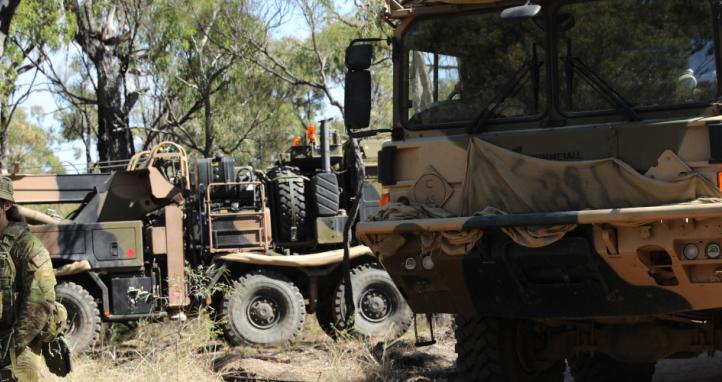Linguists provide the Australian Army with a unique capability on operational deployments. Without them, the Army would struggle to communicate with local populations, advise and mentor partnered forces, or develop a true understanding of the operational environment. However, the opportunities for gaining formal language skills within the Army are few and far between. Is the Army really as future ready as it needs to be regarding language skills?
In this episode of Cove Thoughts, we are joined by a range of guests to examine the operational importance of Army linguists, look at how the Army currently trains its linguists, and explore some alternate ways in which soldiers can develop language skills.
Has this podcast interested you in learning a language? There are so many different apps and courses out there it can be difficult to know where to start. Check out this review of some of the leading language providers. Additionally, some learning providers provide short courses online, such as these courses in Tongan from Udemy. So what are you waiting for? Why not make 2020 the year you invest in learning a language?










Fortunately the team at DFSL have formed a Skills Maintenance Package on the Defence learning site (ADELE) which cover off on critical skills in the form of exercises and past tests from previous refresher courses.
A way to further improve ADF linguist skills maintenance is to recruit and qualify ADF members who already know a LOTE, particularly those who have it as a native tongue spoken among family. By far the best way to do this is to target the reserve forces, particularly those in Melbourne and Sydney due to the large ethnic populations that serve in the various units. Common languages that can be found among reserve forces are Cantonese, Mandarin, Hindi, Arabic, and Spanish. Maintaining a linguist capability can be costly, time consuming and difficult to co-ordinate. The benefit of having, what are essentially pre-qualified linguists, is that there is less resources required to maintain a high linguist competence. Nowadays, the odd online course and perhaps a quick DFSL component will maintain the capability of the target language with little effort.
I never considered learning a LOTE until January this year while skiing in Japan. In Japan, English is not as prevalent to the extent that I assumed it would be. Therefore, I sought to learn a few phrases that would make it easier to order a coffee, order a meal, greet people, and express gratitude for the exceptional hospitality that is so characteristic of Japanese culture. After reading a number of reviews like the one referenced in this podcast, I downloaded and started using DuoLingo. Thanks to this app, I learnt those useful phrases very quickly. As pointed out by the contributors to this podcast, the ability to speak even a small amount of the native language goes a long way in terms of how one is received in a foreign culture. The locals genuinely appreciated the attempt to communicate with them in their own language. From the confidence of this initial achievement, I kept going – and I haven’t stopped.
After returning from Japan, I was immediately deployed on OP BUSHFIRE ASSIST. During the spare time that I was able to find, generally being in the late evening, there wasn’t much else to do, so I kept up the study. I continued using DuoLingo, as well as another app called MemRise to help with Kanji more specifically. While I haven’t used it much at this stage, I also purchased a text book called “80/20 Japanese” which, as the name suggests, utilises the Pareto principle, to good effect.
Over the course of that eight weeks, in the 5-30 minutes that I spent most evenings, I learnt to read and confidently pronounce both syllabaries of the Japanese language, about 100 words, a multitude of their contextual phrases, and the basics of Japanese grammar that formulate those phrases. I have since doubled that. The COVID-19 affected period has provided more free time than I think I otherwise would have in my current appointment. That free time has no doubt contributed to the ability and motivation to keep going, however, as mentioned by the speaker – if you are struggling to find time, spend less of it on social media.
In addition to learning the actual language, there have been some other surprising benefits to this self-study. Firstly, I pay more attention to my English written communication. Learning a language, as they say, truly is brilliant ‘brain training’. Secondly, studying a language is a remarkable way to unwind. The ‘pleasant’ user interfaces of the apps help with that, so does the fact that you are immersed in something completely unconcerned with the day to day. Therefore, if you are looking for something to help you unwind from the demands of our profession, learning a language might just be what you are looking for.
Finally, most reliable references will tell you that there are four aspects of effectively learning a language – (1) pronunciation, (2) listening, (3) vocabulary and (4) grammar. The use of an app or a text book alone won’t make you a master in all areas. Individual self-study, however, I believe is a very cost-effective way to attain 80% proficiency; the other 20% - effective listening and the nuances of pronunciation, for example - can be polished through other means, such as with a tutor, much later down the track.
ADFは日本語話してのメ-ムバありますか?
ADFはどうに日本語トレニングをしますか?
Good day, I'm interested to concentrate/join a group of ADF Japanese language speakers on a Forcenet group if there are any in the ADF and find out how to best use our unique language abilities to the benefit of ADF.
I know this was posted a while back but ive only recently reactivated with ADF reserves transferring from Infantry to Medics.
Id be interested in seeing what opportunities there are for japanese speakers within the ADF.
Jeremy